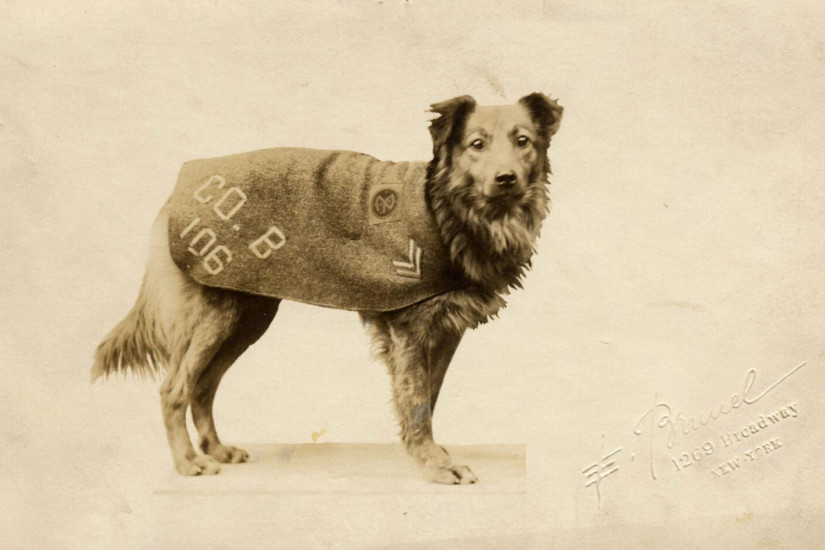Lucky, a German Shepherd, was given to the Watson family by a close friend. For the first year and a half of his life, Lucky lived the life of an ordinary family dog, exploring the woods and creeks of Tamaqua, Pennsylvania. In 1945, however, Donald Watson was on the verge of entering the U.S. Navy and his wife and infant son were due to move in with her family in Washington, D.C. There was no space for the dog in the city, and the Watsons had a tough decision ahead of them. “There was no way in which I could take him with me into the service,” Donald said, “so we had to do something about taking care of the dog while our family was broken up. And the Marines were desperate for dogs. They were asking and pleading with people to enlist their dogs. And as soon as I called the Marine Corps, they came right back to me and said, ‘Yes, we want your dog’.”

Walter John Pawlowicz with dog at base camp. Walter John Pawlowicz Collection (AFC 2001/001/8129), Veterans History Project, American Folklife Center, Library of Congress.
Shortly after, Lucky was sent via train to Camp Lejeune, for basic training. Watson explained: “He was in a crate marked ‘USMC Devil Dog.’ All of the dogs at that time were known as Devil Dogs. And that was because, originally, many of the Marines were known as Devil Dogs, themselves. Later on during the war, the official designation was changed to War Dog. And I think that’s because the Army also had dogs in the service.”
When asked if the family was kept informed about Lucky’s life in the Marine Corps, Donald replied:
“Oh, yes. The Marines were wonderful. At the time he completed his basic training, they wrote and told us that he had passed his basic training, and had been promoted to Private First Class, and was being sent out to the Pacific Theater as a replacement for a casualty. Well, we were pleased that he had passed his rigorous training, but we didn’t exactly like the idea of replacing a casualty. So we know that his first action in the Pacific was really a final training. It was searching out hidden Japanese soldier who had taken refuge in caves on Guam. And because the dogs were so sensitive to the presence of people, the dogs were used to find those hidden soldiers who were armed and dangerous.”

Scout Dog Fritz, who was KIA in Vietnam, 58th Scout Dog Platoon, Camp Evans, Vietnam. Lloyd Joseph Rahlf Collection (AFC 2001/001/45552), Veterans History Project, American Folklife Center, Library of Congress.
